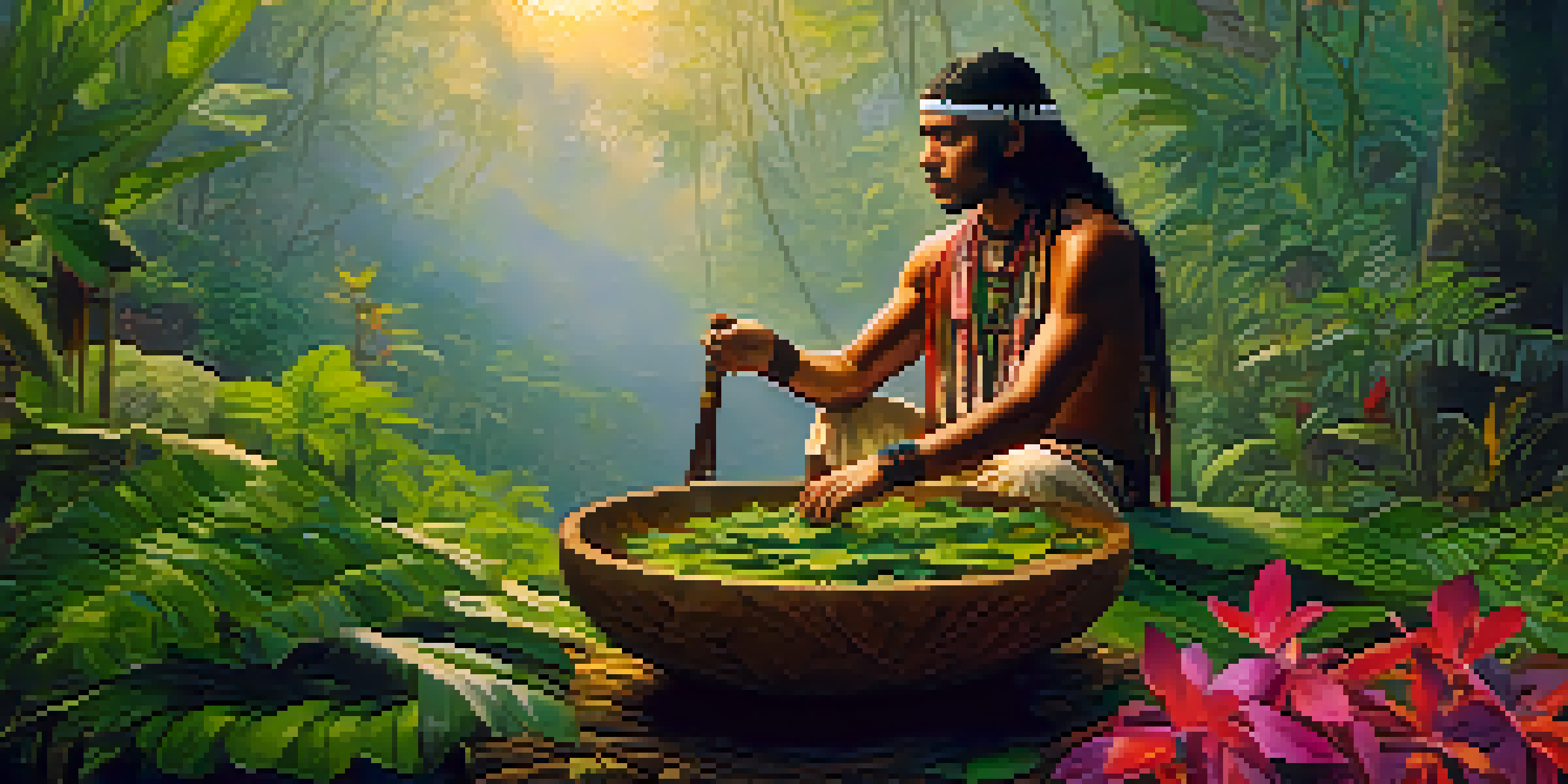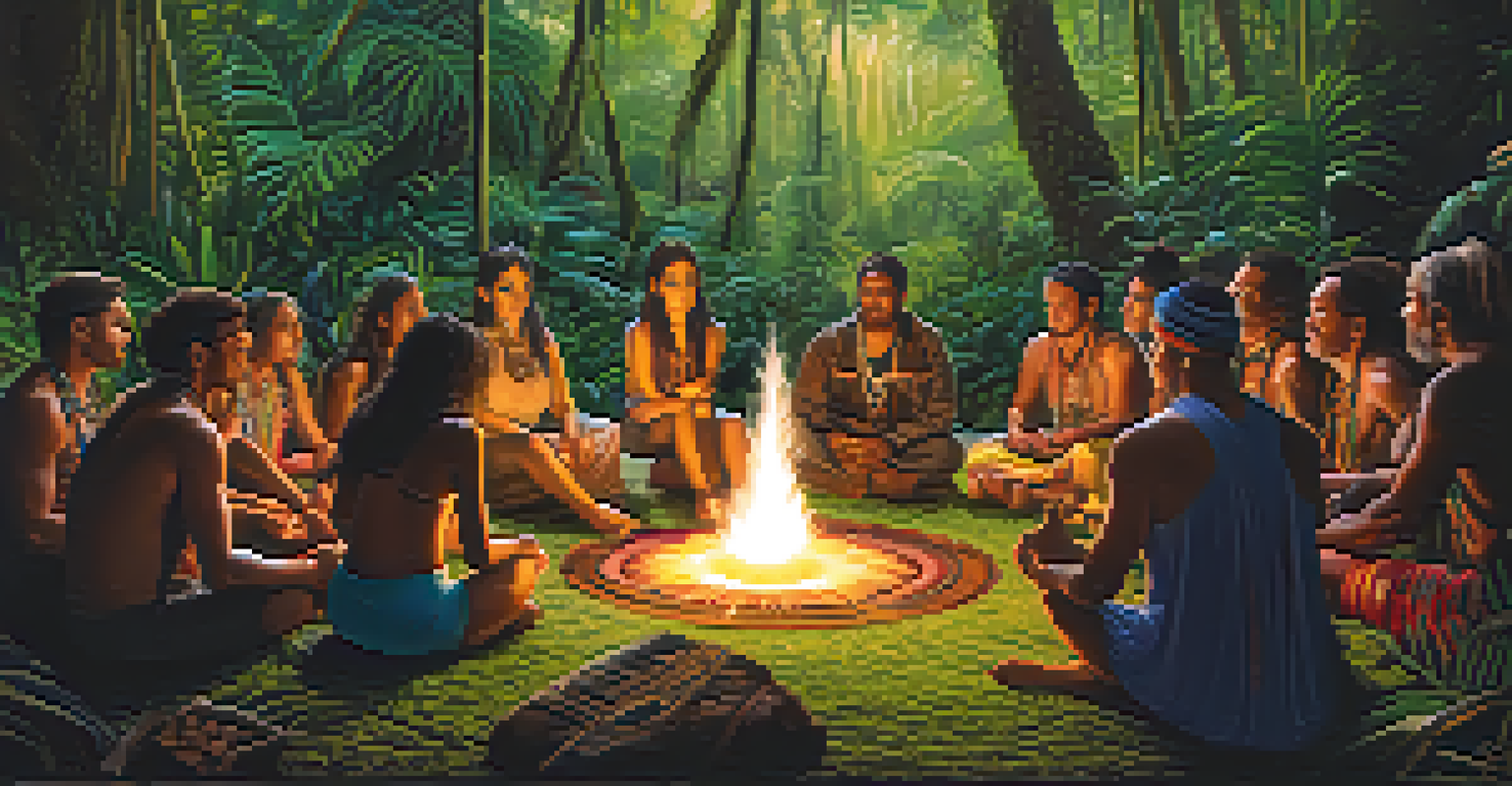Ayahuasca and the Transmission of Indigenous Knowledge Systems

Understanding Ayahuasca: A Sacred Plant Medicine
Ayahuasca is a powerful brew made from the Banisteriopsis caapi vine and other plants, primarily the chacruna leaf. Traditionally used by Indigenous communities in the Amazon, it is known for its psychoactive properties and spiritual significance. This sacred medicine has been utilized in healing ceremonies for centuries, facilitating deep introspection and connection with the spiritual realm. Understanding Ayahuasca's role goes beyond its chemical components; it is deeply intertwined with the cultural identity of the people who use it.
Ayahuasca is a catalyst for healing, a bridge between the mind and spirit, allowing individuals to confront their deepest fears and traumas.
The experience of consuming Ayahuasca often leads to profound insights and emotional breakthroughs, which many describe as life-changing. Participants frequently report encounters with visions, strong emotions, and a sense of unity with nature and the cosmos. These experiences are not just personal; they reflect a collective wisdom passed down through generations. This sacred knowledge is a testament to the resilience and adaptability of Indigenous cultures amid modern challenges.
Thus, Ayahuasca serves as a bridge between the physical and spiritual worlds. It embodies a holistic approach to well-being that encompasses mental, emotional, and spiritual health. This connection emphasizes the importance of respecting and preserving Indigenous knowledge systems in a rapidly changing world.
The Role of Indigenous Knowledge in Ayahuasca Use
Indigenous knowledge systems encompass the traditions, practices, and beliefs that have developed over centuries within specific cultures. In the context of Ayahuasca, this knowledge includes the selection of plants, preparation methods, and ceremonial practices. Each element is significant, as it reflects the deep relationship between the people and their environment. This connection fosters a sustainable way of life that honors the land and its resources.

When Ayahuasca is ingested, it is often within a ceremonial framework led by a shaman or healer, who plays a crucial role in guiding participants through their journey. The shaman's expertise, rooted in Indigenous knowledge, ensures that the experience is safe and meaningful. This guidance is essential, as it helps participants navigate the intense emotions and visions that can arise during the ceremony, reinforcing the importance of mentorship in these practices.
Ayahuasca's Spiritual Significance
Ayahuasca serves as a bridge between the physical and spiritual worlds, emphasizing the holistic approach to well-being within Indigenous cultures.
Moreover, the transmission of Indigenous knowledge through Ayahuasca rituals promotes cultural continuity. Elders pass down their wisdom to younger generations, ensuring that the collective memory and identity of the community remain intact. This practice not only preserves traditional knowledge but also empowers individuals to find their place within the larger narrative of their culture.
Ayahuasca and Its Healing Properties
Many people seek Ayahuasca for its reputed healing properties, particularly for mental health issues such as depression, anxiety, and trauma. Research suggests that the brew may facilitate emotional release and cognitive shifts, allowing individuals to confront and process unresolved issues. This therapeutic potential has sparked interest from both the scientific community and those seeking alternative healing methods.
To understand Ayahuasca is to respect the intricate tapestry of Indigenous wisdom that has nurtured it for centuries.
During Ayahuasca ceremonies, participants often report experiencing cathartic moments, where they confront past traumas and gain insights into their lives. This process can be likened to peeling back layers of an onion—each layer representing a different aspect of their psyche. The result is not always easy, but it can lead to significant personal growth and transformation.
It's important to note that while Ayahuasca can be therapeutic, it is not a panacea. Proper preparation, integration, and guidance from experienced practitioners are essential to ensure a positive experience. This highlights the need for respect and understanding of the cultural context in which these ceremonies take place, as they are rooted in centuries of Indigenous wisdom.
The Rituals and Ceremonies Surrounding Ayahuasca
Ceremonies involving Ayahuasca are often deeply structured events that last for several hours and are conducted in specific settings. These rituals typically include chanting, music, and guided meditation, all of which help to create a sacred atmosphere conducive to healing. The role of the shaman is pivotal, as they lead participants through the experience with songs known as icaros, which are believed to carry healing vibrations.
The communal aspect of these ceremonies cannot be overstated. Participants often share their experiences both during and after the ceremony, fostering a sense of connection and support. This collective sharing creates a powerful bond among participants, reinforcing the idea that healing is often a shared journey rather than an isolated one. Such interactions are a cornerstone of the Indigenous understanding of community and well-being.
Cultural Respect is Crucial
Engaging with Ayahuasca requires understanding the importance of cultural appreciation versus appropriation to honor Indigenous knowledge and practices.
Furthermore, these rituals are often accompanied by specific dietary and lifestyle preparations leading up to the ceremony. Participants may engage in fasting or consume a special diet to prepare their bodies and minds for the experience. This holistic approach underscores the importance of spiritual and physical readiness in the Ayahuasca tradition.
Cultural Appropriation vs. Cultural Appreciation
As Ayahuasca gains popularity in Western societies, discussions around cultural appropriation versus cultural appreciation have emerged. Many Indigenous leaders emphasize the need for respect and understanding when engaging with their traditions. Cultural appropriation occurs when elements of a culture are taken without permission or acknowledgment, often leading to commodification and loss of meaning.
On the other hand, cultural appreciation involves recognizing and honoring the significance of these practices while respecting their origins. This means engaging with Indigenous communities, seeking permission, and supporting their rights and sovereignty. By doing so, individuals can help ensure that the knowledge and traditions surrounding Ayahuasca are preserved and respected.
Navigating this complex landscape requires sensitivity and commitment to ethical practices. Those interested in Ayahuasca must educate themselves about its cultural significance and the implications of their participation. This awareness fosters a more respectful dialogue between Indigenous communities and outsiders, ultimately benefiting everyone involved.
Scientific Research on Ayahuasca
Scientific interest in Ayahuasca has surged in recent years, with researchers exploring its potential therapeutic benefits, especially in mental health. Studies indicate that the active compounds in Ayahuasca, such as DMT (dimethyltryptamine) and harmala alkaloids, may promote neuroplasticity and emotional healing. This research is crucial, as it validates the experiences of those who undergo Ayahuasca ceremonies, bridging the gap between traditional Indigenous knowledge and modern science.
However, the scientific exploration of Ayahuasca must be approached with caution. Ethical considerations arise when studying a substance that is deeply sacred to Indigenous cultures. Researchers are increasingly aware that they must engage with these communities, gaining insights and guidance from those who have been using Ayahuasca for generations. This collaborative approach respects the cultural context while contributing to a broader understanding of the brew's effects.
Scientific Research Validates Healing
Recent studies on Ayahuasca highlight its potential therapeutic benefits for mental health, revealing a connection between traditional practices and modern science.
Moreover, scientific research can help dispel myths and misconceptions surrounding Ayahuasca. By providing evidence-based findings, researchers can promote informed discussions about its use, ensuring that people are aware of both the potential benefits and risks. This balanced perspective is essential for fostering a respectful dialogue between traditional practices and contemporary therapeutic approaches.
The Future of Ayahuasca and Indigenous Knowledge
As awareness of Ayahuasca continues to grow globally, the future of this sacred plant medicine lies in the balance between preservation and adaptation. Indigenous communities face significant challenges, including land rights violations and cultural erosion, which threaten their traditional practices. By advocating for Indigenous sovereignty and supporting their rights, we can help ensure the survival of these crucial knowledge systems.
The increasing interest in Ayahuasca also presents opportunities for cultural exchange and collaboration. By engaging respectfully with Indigenous practices, individuals can contribute to the revitalization of these traditions, allowing them to thrive in contemporary society. This collaboration can lead to innovative approaches to mental health and well-being that honor both Indigenous wisdom and modern therapeutic practices.

Ultimately, the future of Ayahuasca is intertwined with the recognition of Indigenous knowledge as a vital component of humanity's heritage. By valuing and respecting this wisdom, we can cultivate a deeper understanding of ourselves and our place in the world. This journey forward requires a commitment to ethical practices, mutual respect, and a shared vision for a more just and equitable future.